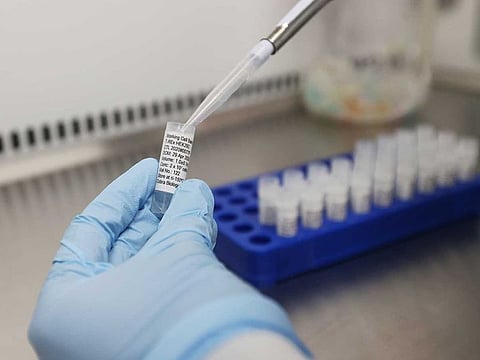COVID-19 vaccine for all: But who gets it first?
$567 million fund aimed to ensure access to COVID-19 vaccines for all

Highlights
- $8.8 billion pledged at the Global Vaccine Summit
- 32 donor governments, 12 foundations and organisations come together to help immunise millions of children
- $567 million raised for new financing tool to provide access to COVID-19 vaccines for low- and middle-income countries
- 300 million children in poorest countries would get immunisation shots for preventable diseases until 2025
Dubai: When the COVID-19 vaccines get finally approved, who will get it first? Will the vaccines also be available in poor countries at the same time they will be out in developed ones?
The race is on among the world's scientific community to get a vaccine out of accelerated trials to make sure they're both safe and effective. There are several front-runners now in advanced human trials.
It’s been said that to beat the COVID-19 pandemic, the world needs more than a breakthrough in science — it also needs a breakthrough in generosity.
Access to COVID-19 vaccines by poor and middle-income countries is now, at least theoreticaly, within reach.
The hope that there will be enough funding and global coordination to ensure access for all. That work would be thanks in part to Gavi, The Vaccine Alliance.
Q: How will vaccine access for poor nations be funded?
The Global Vaccine Summit, hosted by the UK on Thursday (June 4, 2020), saw $8.8 billion in pledges by world leaders, exceeding the target of $7.4 billion. A big chunk of the amount would support the global fight against COVID-19.
Q: Where will the money go?
Q: What is Gavi?
Officially “Gavi, the Vaccine Alliance” is a public–private global health partnership that aims to boost access to immunisation in poor countries. It was founded in January 2000 by the Bill & Melinda Gates Foundation. It is headquartered in Geneva, Switzerland.
Q: How did COVID-19 disrupt the immunisation of children?
There are 80 million children under the age of one at risk of disease due to disruptions to vital immunisation programmes because of COVID-19, according to joint estimates made by Gavi, the WHO and UNICEF.
Q: What is the use of vaccines?
With vaccines, hundreds of millions of deaths or life-long debilitating afflictions have been prevented. For example, polio has been pushed to the brink of eradication, thanks to vaccination.
In the past few years, new vaccines have become available for Ebola and malaria.
Over the past 20 years, vaccine coverage has improved significantly in reducing child mortality across Africa and Asia.
Q: What is the main problem or challenge with vaccines?
Vaccine development is expensive and time-consuming. On average, it takes about 16 years of research and trials to develop a new vaccine.
After rigorous trials to prove their efficacy and safety, vaccines have proven effective against numerous diseases. But vaccines can be expensive, and makes access by countries difficult. Vaccines only realize their true potential when they are deployed to protect the poorest and most vulnerable.
The WHO warned that the COVID-19 pandemic is unravelling many of the gains made, with vaccination campaigns for polio, cholera, measles, diphtheria, and meningitis.
Q: What do the funding commitments mean?
The funding commitments mean that the Gavi will be better able to maintain immunization in lower-income countries, and mitigate the impact of the COVID-19 pandemic.
The funds will also help strengthen health systems.
Q: Which country is the largest Gavi donor?
The UK remains the Vaccine Alliance’s largest donor, pledging the equivalent of £330 million per year over the next five years.
Other top donors include the Bill & Melinda Gates Foundation, Norway, Germany and the United States.
Eight countries made their first-ever pledge to Gavi, including:
Q: How much will Gavi-supported countries contribute?
Gavi supports the routine vaccination of hundreds of millions of children in lower-income countries from infectious diseases. The fresh pledges will also be used to help lower-income countries meet the challenge of the coronavirus pandemic by strengthening health systems and vaccine distribution.
Gavi-supported countries will contribute $3.6 billion towards the cost of buying vaccines – more than double the amount for the 2016-2020 period and more than 40 per cent of the total estimated cost of supplying vaccines to these countries.
They are also expected to invest around $6 billion in immunisation service delivery costs over the same period.
Q: Does Gavi help reduce the price of vaccines?
Yes. Gavi’s efforts to make life-saving vaccines more affordable have seen a 21 per cent price reduction for fully immunising a child with "pentavalent" (also known as 5-in-1 vaccine), pneumococcal and rotavirus vaccines — from $20.01 in 2015 to $15.90 in 2018.
Q: How will low- and middle countries have access to COVID-19 vaccines?
The summit saw the launch of the Advance Market Commitment for COVID-19 Vaccines (Covax AMC), a new financing tool to provide access to COVID-19 vaccines for low- and middle-income nations.
Q: What is the significance of the Covax AMC initiative?
The move is seen as a way to ensure equitable access to future COVID-19 vaccines. The $567 million was raised as seed money for the AMC from 12 donors.
Dr Seth Berkley, CEO of Gavi, the Vaccine Alliance pointed out that the next big challenge is ensuring universal access to COVID-19 vaccines.
"We now need support to help ensure the most vulnerable people in low- and middle-income countries – as well as those in high- and upper middle-income countries – have access to COVID-19 vaccines."





